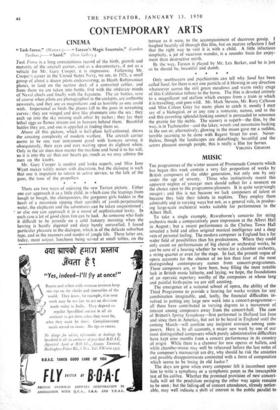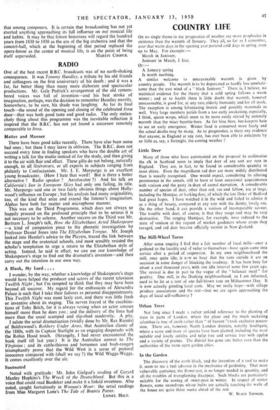MUSIC
THE programmes of the winter season of Promenade Concerts which has begun this week contain a very fair proportion of works by British composers of the older generation, but only one by any under the age of seventy. Those who instinctively resent this apparent neglect of younger men should reflect for a moment on the choice open to the programme-planners. It is quite surprisingly meagre ; and this is not because we lack composers of talent or because they hide their talents in napkins. They employ them admirably and in varying ways but not, as a general rule, in produc- ing large-scale orchestral works suitable for performance in the Albert Hall.
To take a single example, Rawsthorne's concerto for string orchestra made a comparatively poor impression at the Albert Hall in August; but a recent performance in the Chelsea Town Hall revealed a bold and often original musical intelligence and a deep vein of personal feeling. The modern composer in England has a far wider field of possibilities than his predecessors. Where they could only count on performances of big choral or orchestral works, he can be sure of a hearing whether he writes for a chamber orchestra, a string quartet or even for the stage. In fact, the present vogue of opera accounts for the absence of no less than four of the most distinguished contemporary names from concert-programmes. These composers are, or have been, busy filling the most notable lack in British music hitherto, and laying, we hope, the foundations of an operatic repertory worthy of the companies at whose long - and painful birth-pains we are still assisting.
The emergence of a national school of opera, the ability of the Third Programme to provide a hearing for works writteh for any combination imaginable, and, lastly, the financial difficulties in- volved in putting any large new work into a concert-programme- all these have contributed in varying degrees to a movement of interest among composers away from the concert-hall. The case of Britten's Spring Symphony—first performed in Holland last June and since then in America, but not to be heard in England until the coming March—will confirm any incipient aversion among com- posers. Here is, by all accounts, a major new work by one of our most distinguished composers which purely administrative difficulties have kept nine months from a concert performance in its country of origin While there is a clamour for new operas or ballets, and while chamber-music may well be rehearsed before the last notes of the composer's manuscript are dry, why should he risk the anxieties and possible disappointments connected with a form of composition which seems to be losing its old kudos?
The days are gone when every composer felt it incumbent upon him to write a symphony or a symphonic poem as the inescapable test of his calibre. Whether the promised provision of new concert- halls will set the pendulum swinging the other way again remains to be seen ; but the falling-off of concert attendance, already notice- able, may well indicate a shift of interest in the public parallel to
that among composers. It is certain that broadcasting has not yet exerted anything approaching its full influence on our musical life and habits. It may be that future historians will regard the hundred years from 1830 to 1930 as the era of the big orchestra and that the concert-hall, which at the beginning of that period replaced the opera-house as the centre of musical life, is on the point of being































 Previous page
Previous page